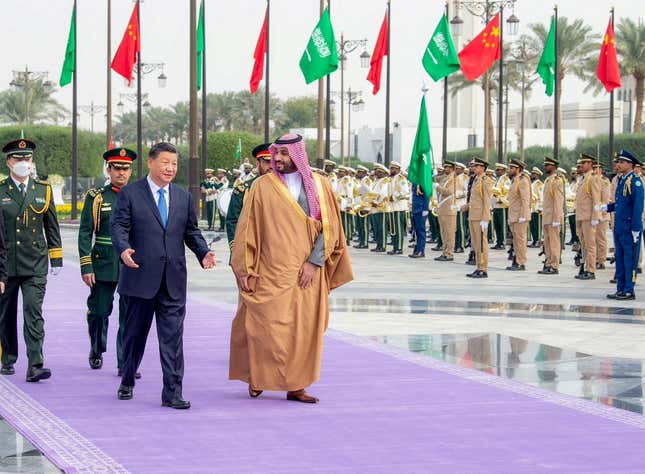
On Dec. 9, the leaders of Saudi Arabia and China met in Riyadh—Xi Jinping’s first visit there since 2016. He and his counterpart, crown prince Mohammed bin Salman, agreed meet more often and signed a number of deals broadly aimed at aligning the countries’ mid-term development agendas, China’s Belt and Road Initiative and Saudi’s Vision 2030.
At the heart of Chinese-Saudi relations is oil. No specific oil deals were disclosed during the meeting, but the Riyadh meeting was clearly a chance for the countries to firm up their longstanding energy trade relations. Saudi Arabia is the top supplier of oil to China, and China is its biggest oil customer, importing $43.9 billion in Saudi crude in 2021.
Now, though, there’s a bear in the room: Russia.
In normal times, Russia and OPEC countries like Saudi Arabia see eye-to-eye on oil, sharing an intent to counter the US and Canada. When US president Joe Biden visited Saudi Arabia in June to push OPEC to raise its oil output, Saudi Arabia chose instead to hold its production steady. That strengthened Russia’s hand, at a time when its oil exports are increasingly being sanctioned because of the war it is pursuing in Ukraine; Saudi Arabia’s decision made it harder for other countries to spurn Russian oil. Not surprisingly, it also caused US-Saudi relations to deteriorate.
Russia and OPEC are competing for business in China
But in the case of China, Saudi Arabia and Russia are more at odds. Before it invaded Ukraine, Russia sold most of its oil to Europe. Now that market is closed off. China has become Russia’s top oil customer, and has been able to wring deep discounts out of Russian suppliers, which have little choice but to accept. The alternative would be to cut off one of the Kremlin’s most important sources of revenue.
“All the leverage is with China right now, because Russia doesn’t have that many options,” said Paddy Ryan, assistant director for European energy security at the Atlantic Council, a Washington think tank.
Russia’s discounts, Ryan said, “might cause a bit of tension with OPEC, if [Russia’s low prices] are pushing out the Saudis and UAE.” Even though OPEC has picked up some of Russia’s business in Europe, that market is much smaller than China, and European policymakers are pushing harder than ever to roll out electric vehicles and otherwise wean their nations off oil no matter the source: “The EU is not really a market you’d want to trade for India and China,” Ryan said.
Xi’s visit to Saudi Arabia and the agreements signed there suggest that China sees Russia’s cheap oil as an opportunistic convenience and Saudi Arabia’s oil as a safer long-term bet. That will worry Russia’s producers, which are unlikely to regain their European market anytime soon.